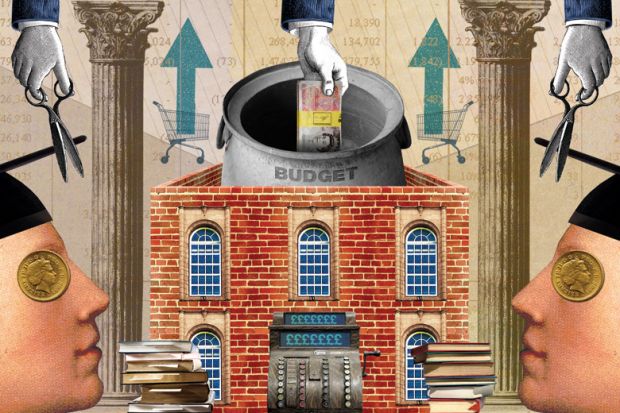It’s no secret that I have always opposed charging tuition fees to UK residents. It’s bad for young people and bad for the country. But let’s get real: once they are implemented, they have to go up in line with costs unless new subsidies are introduced.
Despite all the talk of marketisation, tuition fees have been fixed for several years, and the pressure is building. We are in for a good dose of irrationality as we enter a phase when either fees will rise or standards will drop.
Recently, John Pugh, the Liberal Democrat spokesperson for education, complained about the “arrogance” of universities raising their fees to the new £9,250 threshold. My response is simple. You supported a system of fees: surely you realised that they would have to go up at some time?
Then there are those who say that marketisation will produce a better and cheaper service in the long run. It may well do that in some areas and for some lower-cost subjects – as distinct from those the country actually needs. But for the bulk of our provision, we already have fierce competition, and that won’t stop inflation pushing up costs of delivery.
Some will say that we should be able to get more money from other sources. Let’s take industry first. The Higher Education Funding Council for England put the total value of business partnerships with industry at £4.2 billion in 2014-15. But these are driven by the commercial desire to improve productivity and gain further business. We need to work closely with industry, but we can’t expect it to pick up the tab for teaching. In areas where there is overlap between commercial need and high-quality vocational education, we can and do have joint apprentice degrees. But in financial terms, even 600 apprentices are small beer, and we can’t get ahead of the jobs and economic confidence necessary to make them viable.
Some say that UK universities should be better at philanthropy, pointing to the US, where wealthy alumni fund generous scholarships. We work like stink on this, but we have to be realistic. Outside Oxbridge, our ability to generate funds and grow endowments is modest at best. Harvard University has an endowment of £28.5 billion. The University of Sheffield has £39 million: not many scholarships at today’s interest rates.
There is one area in which we have been damn successful in getting extra income: fees from international students. Rightly admiring our teaching and reputation, these students have dug deep to pay for the labs and libraries that give the ill-informed the impression that we are rolling in cash. The cross-subsidy to UK higher education from overseas is enormous, adding to the talent and goodwill I fear that the UK has been recklessly willing to undermine. But the political focus on immigration, culminating in the Brexit vote, means that we’d be mad to count on a never-ending increase in international students, whatever some in government might say about the importance of expanding this export market.
So what else is there? Research income? Don’t be daft! Don’t our critics know that we lose money on research? Certainly our scholarship and reputation depend on it, but anyone looking for a source of wealth is deluded.
So what is left? Just cut our costs? But the bulk of those are in staff. And if we don’t have the best teachers, what then? Academics are internationally mobile, and most universities are reporting that Brexit is making it tougher to recruit from the Continent. Other costs, such as electricity, go steadily up. We do all we can to minimise them, but energy is vital to key areas of research such as plant science, which studies growth across the full range of environmental conditions. You can’t do that by Mooc.
Are there other options? For the country there are some; I am not advocating them, but we need to be honest. Students could have their numbers restricted, or be funnelled into less expensive courses. The latter could be achieved by starving universities of cash (while insisting on greater spend on widening participation) so they cut expensive courses such as science and engineering of their own accord. That way, the government could blame it on the market.
That market also entails big spending on marketing. Many service industries spend about 10 per cent of their revenue on advertising just to compete. Once UK higher education becomes a “buyer’s market”, with students purchasing an aspirational brand as an investment, do we really think we will be immune?
I am no advocate of the status quo. I believe that the UK needs a different balance in what we teach and research, based on radical thinking about how we work with industry and society. But marketisation will not help. Nor will the gradual starvation of resources.
They say that you get what you pay for. You also get what you won’t pay for. The price of our refusal to see the public value of a system of higher education moulded to the nation’s needs as well to as 17-year-olds’ loan-underwritten preferences may be a lot higher than we anticipated.
Sir Keith Burnett is vice-chancellor of the University of Sheffield.
POSTSCRIPT:
Print headline: Starved of resources, campuses must raise fees or drop standards
Register to continue
Why register?
- Registration is free and only takes a moment
- Once registered, you can read 3 articles a month
- Sign up for our newsletter
Subscribe
Or subscribe for unlimited access to:
- Unlimited access to news, views, insights & reviews
- Digital editions
- Digital access to THE’s university and college rankings analysis
Already registered or a current subscriber? Login




